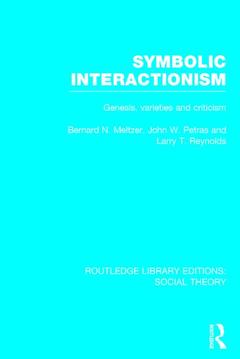Symbolic Interactionism (RLE Social Theory) Genesis, Varieties and Criticism Routledge Library Editions: Social Theory Series
Auteurs : Meltzer Bernard, Petras John, Reynolds Larry

Symbolic interactionsim is of major importance in contemporary sociology. In this study, three authorities in the field collaborate to define symbolic interactionism and to describe, and present criticism of, the interactionist perspective. The contributions of G.H. Mead, J. Dewey, C.H. Cooley, W.I. Thomas and other theorists to the interactionist viewpoint on human behaviour and social life are examined. There is a systematic discussion of the diverse schools of thought within the field, including H.G. Blumer?s Chicago School, M.H. Kuhn?s Iowa School, E. Goffman?s dramaturgical approach and H. Garfinkel?s ethnomethodology. Criticisms of symbolic interactionism by both adherents and opponents to the perspective are selected and assessed. Throughout the book, the authors survey the social and intellectual sources of significant ideas, thereby incorporating a reflexive, sociology-of-sociology orientation.
1. The Genesis of Symbolic Interactionism 1.1. William James (1842-1910) 1.2. Charles Horton Cooley (1864-1929) 1.3. John Dewey (1859-1952) 1.4. W.I. Thomas (1863-1947) 1.5. George Herbet Mead (1863-1931) 1.6. Defining Characteristics of Early Interactionism 2. Varieties of Symbolic Interactionism 2.1. Introductory Remarks 2.2. The Chicago and Iowa Schools 2.3. The Dramaturgical Approach 2.4. Ethnomethodology 2.5. Summary 3. Criticisms of Symbolic Interactionism 3.1. In-house Criticisms 3.2. Non-interactionist Criticisms 3.3. Interactionism and its Biases 3.4. The Astructural Bias: Recent Evidence 3.5. Interactionists’ Indispensible Concepts 3.6. A Final Comment
Date de parution : 08-2014
15.6x23.4 cm
Date de parution : 12-2015
15.6x23.4 cm
Thèmes de Symbolic Interactionism (RLE Social Theory) :
Mots-clés :
Symbolic Interactionism; Symbolic Interaction-ism; ethnomethodology; Sympathetic Introspection; intellectual sources; Iowa School; criticism; Social Organization; contemporary sociology; Early American Sociology; Practical Sociological Reasoning; Early Symbolic Interactionism; Mead’s Theory; Individual Society Relationship; Symbolic Interactionist Analysis; Dramaturgical Approach; Human Group Life; Early Interactionists; Cooley’s Theory; University Of Wisconsin; Dramaturgical Analysis; Symbolic Interaction Framework; Animal Kingdom; Mead’s Philosophy; Meadian Statement; Primary Group; Mead’s Framework; Violated; Contemporary Society
